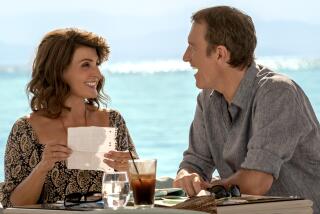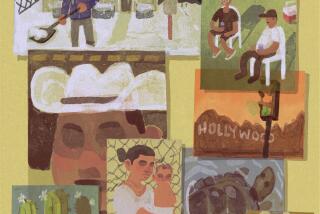Tiny Greek Village Welcomes Back a Son
- Share via
From the rooftop of the hotel, I could see the Parthenon, illuminated in the darkness as if suspended in space. The streets below were a bedlam of noxious cars and buses.
The contrast was unsettling. The crown jewel of ancient Greece engulfed in a cloud of gasoline fumes. This wasn’t the way I had envisioned Greece. This wasn’t the land of Homer and my ancestors. I was at once ashamed and sorry that we had traveled these many miles to pursue a dream that I had long harbored.
I thought we should pack it in and go home. What a long shot to find my father’s birthplace after all these years with just the name of the village. Within my thoughts that night, as I stood there alone upon the rooftop, was the memory of my father, long since dead. He left this land 70 years ago at the age of 15, alone, totally uneducated, bound for Ellis Island and the great unknown: America. I marveled at his audacity and courage, for he had lied and convinced the authorities he was 17 years old.
There was a parallel. Even though I was celebrating my 50th birthday, I could vividly recall another time when a very angry 16-year-old boy left home to see the world. He didn’t leave home because the farm could not support nine children, as was his father’s motivation. No, he left home in a rage of baffling conflicts, not really knowing what was buffeting him, just that he knew he had to get away.
That was many years ago, but the immigrant father had the tolerance, love and patience to wait for the boy to mature. He forgave the boy, the boy forgave him, and in time I forgave myself.
“Here is the map,” my wife said, “and here up in the northwest corner, is Agrinon.” We had rented a German Opel and were about to embark on the last leg of our odyssey.
As a boy, my father had told me that his village was called Manthanisa, and that it was near the city of Agrinon. He used to boast that the oranges were as large as grapefruit, the grapefruit as big as melons, and the tomatoes as sweet as honey. Of course, I didn’t believe him. He would just laugh and continue on with the most outrageous wonders of his village.
My father, Gus, never went back to his village. He never saw his mother or father again. He became an American in the truest sense of the word. An American soldier, a Boston policeman, a convert who passionately loved America, his family and the Red Sox. He raised his kids as full-fledged un-hyphenated Americans. In truth, we only vaguely understood our Greek heritage. Now, 70 years later, I was attempting to fulfill a dream--a dream that I felt compelled to pursue and complete.
We left early in the morning. Even so, the city was teeming with traffic. The impatient drivers were leaning on their horns in place of their brakes. For a culture that was noted for its architecture, modern Athens had fallen on hard times. The new structures are all square concrete, mid-rise buildings. All function, no form.
So it was with great haste that we beat our way north through the labyrinth of maddening traffic to finally reach the outskirts of the city. We breathed a sigh of relief. Who can read Greek street signs anyway, never mind speak it? Dad had left out this one important feature. He didn’t teach any of his kids how to speak Greek.
As we drove north past the Port of Piraeus and up on the coast, my spirits started to rise, for the countryside was becoming green and incredibly beautiful. Now, at last, my expectations were being realized. Each turn in the road and each roadside stop seemed to enhance the experience. Corinth, and the Corinthian coast, is a vision not duplicated anywhere. The Greek mountains, home of the gods of legend, peppered by the omnipresent cypress trees, seem to spill into the azure sea below. Yes, I knew at that precise moment that we had finally arrived in Greece.
Agrinon is the hub of a farm community, definitely not a tourist center with interesting places to see. So it was with pleasure that we bedded early that evening in preparation for the culmination of our search.
“Have you heard of a village called Manthanisa?” we asked. The answer was, as always, no. We must have asked a dozen people but came up blank. Was this it, the end of the search? Maybe Manthanisa was a mythical village, or did I mispronounce it? All of these thoughts and more passed through my mind as we stood there at the central “platio.”
As we were pondering our next more, I felt a tap on my shoulder. A young man spoke to me in perfect English. “My name is George,” he said. “I used to live in Boston. How are my Red Sox doing?” At first we were dumbfounded. What were the chances of finding a guardian angel and a kindred spirit of your father, a Red Sox fan, here in this Byzantium town square?
Incredible as it may seem, George had the answer to the riddle. When my father left Greece in 1908, this sliver of Greece (Ipirus) was still in the hands of the Turks, and Manthanisa is a Turkish name. In 1912 the Turks departed and in a burst of patriotic joy, Manthanisa was re-christened Pantanassa, which in ancient Greek means “queen of all” or “mother of Christ.”
My father told me that he was born under an olive tree that was 100 years old. His mother went into labor while working in the fields. These thoughts and others were racing through my consciousness as the three of us drove the 10 miles to Pantanassa. What were our chances of finding anyone named Janikas? After all, my brother, my son and myself were the only male descendants in America. The main street--in fact, the only paved street in the village--is lined with one- or two-story town houses. These houses are, in turn, surrounded by a patchwork quilt of olive, tobacco and citrus fields. The fields are sprinkled with red-tile-roofed cottages, as though they were seasoning for this Greek salad.
George said, “First, we try the coffeehouse, for that is the social center of the village.” As we strode into the coffeehouse, you could see the eyes of these mostly old men, coldly following our every move. George said something in Greek and immediately two of the men got up and cold stares turned to warm toothless grins. They grabbed both of my hands and pumped as though drawing water.
George said, “These are two of your distant cousins. They are Janikas, too.” My first thought was they didn’t look like family. The whole coffeehouse spilled outside to the sidewalk to hear our story and to ply us with coffee and, or course, ouzo (Greek Valium). We were, my wife and I, instant celebrities.
One of the old men had lived in America and knew my father and mother very well. It was an eerie feeling to hear him speak of the distant past as if it were yesterday.
While this celebration was going on, we heard a commotion and a path was cleared through the crowd. George said, “Look, here are your first cousins, Dimitra and Spira.” Two middle-aged ladies with tears and determination in their eyes fell upon me in unison, hugging and kissing and pounding me. I was overcome.
My journey was coming to an end by ironically arriving at my beginning. It was one of those moments topped only by marriage and the birth of your children.
We walked through the village, and Dimitra and Spira were shouting to the people. “George, what are they saying?” I asked.
“They are shouting that Gus’ son has come home.”
More to Read
Sign up for The Wild
We’ll help you find the best places to hike, bike and run, as well as the perfect silent spots for meditation and yoga.
You may occasionally receive promotional content from the Los Angeles Times.






